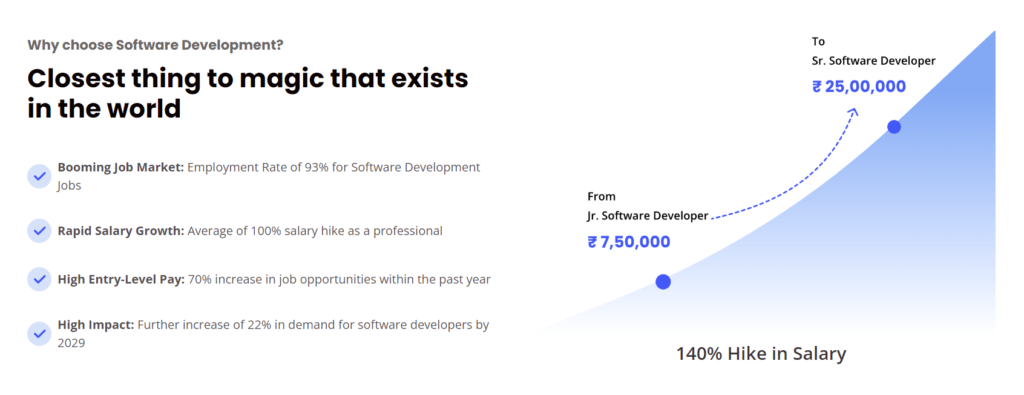How to Become a Web Developer After 12th in 2025?
In the dynamic landscape of today’s digital era, the role of web developers has become increasingly pivotal. As businesses and individuals alike seek a robust online presence, the demand for skilled web developers is on the rise. For students like you after completing your 12th grade, exploring a career in web development can offer not only a promising future but also an avenue for creative expression and innovation. But the question is “How to become a web developer after 12th?“
Fear not, this comprehensive guide will show you the path to becoming a web developer after the crucial milestone of finishing high school. I’ll delve into the intricacies of the profession, discuss the educational pathways available, explore the essential skills required, and provide practical insights on how to kickstart a rewarding journey into the world of web development.
Whether you’re a tech enthusiast or someone looking for a fulfilling and lucrative career, this guide is tailored to equip you with the knowledge and resources needed to navigate the exciting realm of web development after completing your 12th grade. So, let’s unravel the steps and strategies that will set you on the path to becoming a proficient web developer.
Understanding the Role of a Web Developer
A. What does a web developer do?
Web developers are the architects behind the digital spaces we interact with daily. They are the creative minds translating ideas into functional websites and web applications. A web developer’s primary responsibility is to code and design websites, ensuring they are visually appealing, user-friendly, and technically sound. From crafting the layout and appearance to optimizing performance and functionality, web developers play a crucial role in shaping the online experiences of users.
B. Key skills and qualities required for success in web development
Successful web developers possess a unique set of skills that extend beyond mere coding proficiency. Adaptability, problem-solving acumen, and attention to detail are paramount. Strong communication skills are also crucial, as developers often collaborate with cross-functional teams, translating technical jargon into understandable language for non-technical stakeholders.
C. Overview of the different types of web developers (front-end, back-end, full-stack)
Web development is a multifaceted field, and developers often specialize in specific areas. Front-end developers focus on the user interface and user experience, ensuring that websites look and feel appealing. Back-end developers, on the other hand, work behind the scenes, managing databases and server-side operations. Full-stack developers, as the name suggests, possess proficiency in both front-end and back-end development, making them versatile contributors to the entire web development process.
Understanding these distinctions is vital as it helps aspiring web developers identify their areas of interest and tailor their learning journey accordingly. In the upcoming sections, we’ll delve deeper into the skills and educational pathways that will empower you to embark on a successful career in web development after completing your 12th grade.
Benefits of Choosing Web Development as a Career

As you contemplate your career path after completing 12th grade, understanding the potential benefits of choosing web development can guide your decision-making process. The field offers a myriad of advantages that extend beyond the realm of job satisfaction. Let’s explore some compelling reasons to consider a career in web development:
A. High demand in the job market
Web developers are in high demand across industries. Virtually every business, from small startups to multinational corporations, requires an online presence. As a result, the job market for web developers is robust, providing ample opportunities for employment and career growth.
B. Lucrative salary prospects
The demand for skilled web developers is often reflected in competitive salary packages. Salaries can vary based on factors such as experience, specialization, and geographic location, but web development careers generally offer attractive compensation, making it a financially rewarding field.
C. Opportunities for creativity and innovation
Web development is a dynamic and ever-evolving field that encourages creativity and innovation. As a web developer, you have the opportunity to bring ideas to life, design visually appealing websites, and contribute to the user experience. The continuous evolution of web technologies ensures that the field remains exciting and offers room for constant learning and growth.
Choosing web development as a career not only aligns with the current demands of the digital age but also provides a platform for personal and professional development.
Educational Paths to Become a Web Developer After 12th
As you embark on the journey to become a web developer after completing your 12th grade, it’s crucial to explore the educational paths that will equip you with the necessary knowledge and skills. The field of web development offers diverse routes, catering to different learning preferences and career aspirations.
A. Importance of foundational knowledge in mathematics and computer science
A strong foundation in mathematics and computer science can significantly enhance your ability to grasp the core concepts of web development. While not always mandatory, these foundational subjects provide a solid base for understanding algorithms, logic, and problem-solving—all essential skills for a web developer.
B. Overview of relevant degree programs
- Computer Science: Pursuing a degree in Computer Science is a traditional yet robust path to becoming a web developer. This comprehensive program covers a broad range of topics, including algorithms, data structures, and software development, providing a well-rounded education.
- Web Development Programs: Some institutions offer specialized degree programs focused specifically on web development. These programs delve into the intricacies of front-end and back-end technologies, preparing students for the specific challenges of building and maintaining websites and applications.
C. Alternatives to traditional degrees
- Coding Bootcamps: Coding bootcamps are intensive, short-term programs that focus on practical skills and real-world applications. They are designed to quickly immerse participants in the world of coding, making them a popular choice for individuals seeking a fast-track route into the industry.
- Online Courses and Platforms: Numerous online platforms, such as Codecademy, Udemy, and Coursera, offer web development courses. These self-paced courses allow you to learn at your own convenience, making them an excellent option for those who prefer flexibility. But the best web development course is CAP(Career Accelerator Programme) by Prepleaf Masai-Full Stack Web Development & Generative AI. it offers guaranteed internships and job opportunities. Also, you will get a 100% refund if you don’t get a job offer of 10 LPA or more within one year of completing the course!
Enroll Today for Two Weeks of a Free Trial
Enroll today in the best web development course and unlock your potential in the world of web development. Visit the below link to learn more and kickstart your journey to becoming a skilled web developer.
Don’t forget to enter the Code SOUR45 to get Rs.2000!
Building a Strong Foundation in Coding
Now that you have an understanding of the educational paths available, the next crucial step in your journey to becoming a web developer after 12th grade is building a strong foundation in coding. Coding lies at the heart of web development, and proficiency in programming languages is key to translating concepts into functional websites and applications.
A. Introduction to essential programming languages
- HTML (Hypertext Markup Language): HTML is the backbone of web development, used for structuring the content of a webpage. It defines the elements on a page, such as headings, paragraphs, and images.
- CSS (Cascading Style Sheets): CSS complements HTML by styling the visual presentation of web pages. It allows you to control the layout, colors, and overall aesthetic appeal.
- JavaScript: JavaScript is a versatile programming language that enables dynamic and interactive features on websites. It is a fundamental language for both front-end and back-end development.
B. Tips for effective self-study and practice
- Consistent Practice: Dedicate regular time to coding practice. Consistency is key to building muscle memory and reinforcing your understanding of coding concepts.
- Build Projects: Apply your knowledge by working on real projects. Whether it’s a personal website, a simple web app, or contributing to open-source projects, hands-on experience is invaluable.
- Join Coding Communities: Engage with coding communities and forums. Platforms like Stack Overflow and GitHub provide spaces to seek help, share knowledge, and collaborate with other learners and professionals.
Building a strong foundation in coding sets the stage for your success as a web developer.
Gaining Practical Experience
As you delve into the world of web development, theoretical knowledge must be complemented by practical experience. Gaining hands-on experience not only reinforces your coding skills but also provides a tangible showcase of your abilities. Here’s a roadmap to help you navigate the journey of practical application in web development.
A. Importance of hands-on projects and building a portfolio
- Hands-on Projects: Undertaking real-world projects is crucial for applying your coding skills. Start with small projects and gradually increase complexity. This hands-on experience enhances problem-solving abilities and prepares you for the challenges of actual web development tasks.
- Building a Portfolio: A well-curated portfolio serves as a virtual resume showcasing your projects and skills. Include a diverse range of projects that highlight different aspects of web development, such as front-end design, back-end functionality, and full-stack applications.
B. Participating in coding competitions and hackathons
- Coding Competitions: Join online coding competitions on platforms like HackerRank, Codeforces, or LeetCode. These contests provide a competitive yet supportive environment to hone your coding skills and tackle algorithmic challenges.
- Hackathons: Participating in hackathons offers a collaborative space to work on projects within a set timeframe. These events foster creativity, teamwork, and the rapid application of coding knowledge.
C. Seeking internships and freelance opportunities
- Internships: Internships provide a bridge between academic learning and real-world application. Seek internships with companies or startups to gain practical experience, learn industry best practices, and build professional connections.
- Freelance Opportunities: Explore freelance platforms such as Upwork or Fiverr to take on small projects. Freelancing allows you to work on diverse projects, build a client base, and refine your project management and communication skills.
Gaining practical experience not only enhances your coding proficiency but also equips you with the problem-solving mindset crucial for success in web development.
Developing Specialized Skills
Web development is a multifaceted field, and as you progress in your journey, acquiring specialized skills becomes essential for carving out a niche and staying competitive. Let’s explore key areas of specialization within web development and how you can develop expertise in each.
A. Introduction to front-end and back-end technologies
- Front-End Development:
- HTML, CSS, JavaScript: Mastery of these foundational languages is crucial for creating visually appealing and interactive user interfaces.
- Front-End Frameworks: Explore popular frameworks such as React, Angular, or Vue.js to streamline front-end development and enhance user experiences.
- Back-End Development:
- Server-Side Languages: Learn server-side languages like Node.js, Python, Ruby, or PHP to handle data, logic, and server operations.
- Databases: Familiarize yourself with databases such as MySQL, PostgreSQL, or MongoDB to store and retrieve data efficiently.
B. Overview of popular web development frameworks and libraries
- Front-End Frameworks:
- React.js: Widely used for building user interfaces, React.js is maintained by Facebook and offers a component-based architecture.
- Angular: Developed by Google, Angular is a robust framework suitable for building dynamic, single-page applications.
- Vue.js: Known for its simplicity and ease of integration, Vue.js is a progressive JavaScript framework.
- Back-End Frameworks:
- Express.js (Node.js): A minimal and flexible Node.js framework for building web and mobile applications.
- Django (Python): A high-level Python web framework that promotes rapid development and clean, pragmatic design.
- Ruby on Rails: Known for its convention over configuration principle, Ruby on Rails is a framework that prioritizes developer happiness and productivity.
C. Importance of staying updated with industry trends
- Continuous Learning: Web development is a rapidly evolving field. Stay informed about the latest trends, updates, and emerging technologies through blogs, forums, and industry conferences.
- Explore New Technologies: Experiment with emerging technologies such as Progressive Web Apps (PWAs), serverless architecture, and containerization to stay ahead of the curve.
Developing specialized skills not only enhances your value as a web developer but also opens doors to exciting and challenging opportunities.
Networking and Building a Professional Presence
In the competitive landscape of web development, establishing a strong professional network and online presence can significantly boost your career prospects. Networking opens doors to collaborations, mentorships, and job opportunities. Here’s how you can strategically build your network and cultivate a professional online presence.
A. The significance of networking in the tech industry
- Attend Meetups and Conferences: Participate in local meetups, conferences, and industry events to meet fellow developers, professionals, and potential employers. These gatherings offer valuable insights, networking opportunities, and a chance to stay updated on industry trends.
- Join Online Communities: Engage in online forums, social media groups, and platforms such as Stack Overflow and GitHub. Actively participating in discussions, asking questions, and sharing your knowledge can help you connect with like-minded individuals and industry experts.
B. Building a strong LinkedIn profile and online presence
- Optimize Your LinkedIn Profile:
- Professional Headline: Craft a compelling professional headline that reflects your expertise and aspirations.
- Summary: Write a concise and impactful summary highlighting your skills, achievements, and career goals.
- Projects and Recommendations: Showcase your projects and seek recommendations from colleagues or mentors.
- Create a Personal Blog or Website:
- Share your insights, experiences, and projects through a personal blog or website.
- Demonstrate your expertise by contributing to open-source projects or writing tutorials.
C. Connecting with experienced professionals and joining relevant communities
- LinkedIn Connections: Connect with professionals in the web development industry, including recruiters, developers, and influencers. Personalize connection requests to convey your interests and intentions.
- Participate in Forums and Groups:
- Join relevant LinkedIn and Facebook groups focused on web development.
- Contribute to discussions, share resources, and seek advice from experienced members.
Networking is a two-way street—offering support and expertise to others while seeking guidance and collaboration for yourself.
Showcasing Your Skills
Effectively showcasing your skills is paramount in the competitive landscape of web development. A robust portfolio, coupled with a strategic approach to presenting your capabilities, can set you apart from the crowd and leave a lasting impression on potential employers or collaborators. Here’s how you can craft a compelling showcase of your skills:
A. Building an impressive portfolio
- Select Diverse Projects:
- Include a variety of projects in your portfolio that showcase your proficiency in different aspects of web development.
- Highlight projects that align with your desired specialization, whether it’s front-end design, back-end functionality, or full-stack development.
- Provide Project Details:
- For each project, include detailed information such as the technologies used, your role in the project, challenges faced, and solutions implemented.
- Incorporate links to live projects or GitHub repositories to allow visitors to explore your work.
B. Creating a personal website to showcase projects and achievements
- Professional Design:
- Design a clean and professional website that reflects your personal brand.
- Ensure easy navigation and an aesthetically pleasing layout.
- About Me Section:
- Include a brief “About Me” section that introduces yourself, your background, and your passion for web development.
- Share your career goals and aspirations.
- Resume and Achievements:
- Upload your resume for easy access.
- Showcase any relevant achievements, awards, or certifications.
C. Leveraging social media for professional visibility
- Share Project Updates:
- Regularly share updates about your projects on social media platforms.
- Use platforms like Twitter and LinkedIn to showcase your coding skills, engage with the community, and share industry insights.
- Engage in Professional Conversations:
- Join relevant conversations in your field on platforms like Twitter and participate in industry-related hashtags.
- Share your knowledge and insights, and connect with professionals in the industry.
Effectively showcasing your skills not only demonstrates your technical capabilities but also conveys your passion and commitment to potential employers or collaborators.
Job Search and Career Advancement
As you embark on the job search in the field of web development, strategic planning, and a proactive approach are essential. Whether you’re a recent graduate or someone looking to make a career shift after completing your 12th grade, the following strategies can guide you through a successful job search and ongoing career advancement:
A. Crafting a compelling resume and cover letter
- Tailor Your Resume:
- Customize your resume to highlight relevant skills, projects, and experiences.
- Quantify achievements where possible to showcase impact.
- Create a Standout Cover Letter:
- Write a cover letter that succinctly introduces yourself, expresses your enthusiasm for the position, and aligns your skills with the job requirements.
- Address specific points from the job description to demonstrate your understanding of the role.
B. Navigating job boards and company websites for opportunities
- Explore Job Boards:
- Utilize popular job boards like Indeed, Glassdoor, and LinkedIn to discover web development opportunities.
- Set up job alerts to receive notifications for relevant openings.
- Visit Company Websites:
- Explore the careers sections of companies you’re interested in.
- Look for opportunities that align with your skills and career goals.
C. Strategies for continuous learning and career advancement in web development
- Stay Updated with Industry Trends:
- Subscribe to newsletters, follow tech blogs, and join online communities to stay informed about the latest trends and technologies in web development.
- Pursue Advanced Certifications:
- Consider pursuing advanced certifications in specific web development technologies or frameworks to enhance your credentials.
- Networking for Career Growth:
- Continuously build and nurture your professional network.
- Attend industry events, participate in webinars, and connect with professionals for mentorship and career guidance.
- Set Career Goals:
- Define short-term and long-term career goals in web development.
- Regularly assess your progress and update your goals as needed.
Remember, the job search process is not only about finding a position but also about identifying an opportunity for professional growth and alignment with your career aspirations. With a proactive approach and a commitment to continuous learning, you can position yourself for a successful and fulfilling career in web development
Final thoughts on how to become a web developer after 12th?
Web development is a dynamic field, and the ability to adapt to new technologies and industry trends is crucial. Embrace a mindset of continuous learning, stay curious, and be open to exploring emerging technologies that shape the future of web development.
Your journey into web development is not just about acquiring technical skills but also about finding fulfillment in the work you do. As you navigate the challenges and successes, remember to stay passionate, set meaningful goals, and celebrate your achievements along the way.
In closing, the world of web development is yours to explore and shape. Whether you’re driven by a love for coding, a desire to innovate, or the prospect of a rewarding career, the steps outlined in this guide provide a roadmap on how to become a web developer after 12th. If you want to change your life forever, I highly suggest you enroll yourself in the below course as you’re investing in your future. Best of luck on your journey to becoming a skilled and accomplished web developer!
Enroll Today for Two Weeks of a Free Trial
Enroll today in the best web development course and unlock your potential in the world of web development. Visit the below link to learn more and kickstart your journey to becoming a skilled web developer.
Don’t forget to enter the Code SOUR45 to get Rs.2000!






